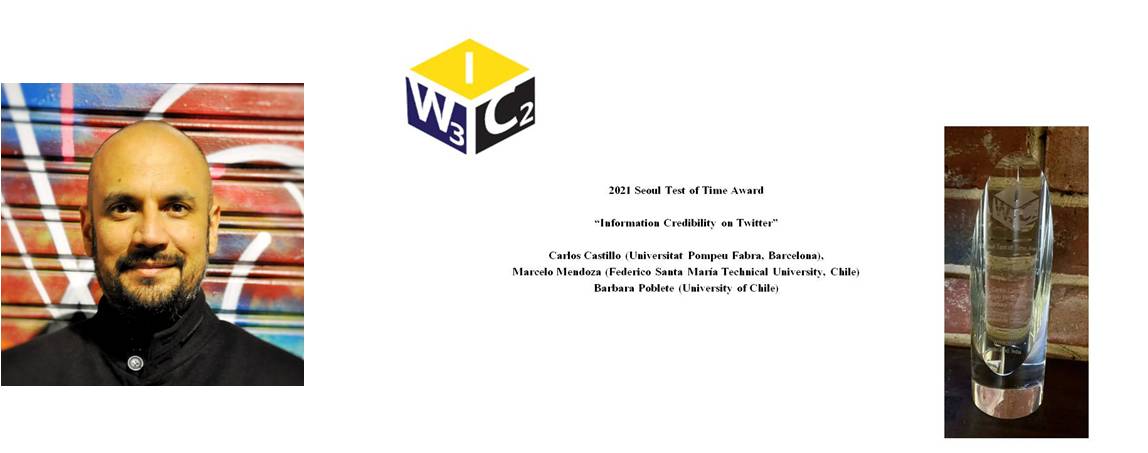Carlos Castillo, 2021 Seoul Test of Time Award, for a study considered a benchmark in the analysis of social networks
Carlos Castillo, 2021 Seoul Test of Time Award, for a study considered a benchmark in the analysis of social networks
Carlos Castillo, 2021 Seoul Test of Time Award, for a study considered a benchmark in the analysis of social networks
Awarded by the International World Wide Web Conference Committee to the authors of a study published in 2011 on the credibility of information on Twitter, of which the DTIC researcher is a co-author along with Marcelo Mendoza (Federico Santa Maria Technical University, Chile) and Barbara Poblete (University of Chile).

On 23 April, the International World Wide Web Conference Committee (IW3C2) announced the winners of the 2021 Seoul Test of Time Award, granted this year for the research “Information Credibility on Twitter” to Carlos Castillo (Pompeu Fabra University, Barcelona), Marcelo Mendoza (Federico Santa Maria Technical University, Chile), and Barbara Poblete (University of Chile), which they published in 2011. Carlos Castillo coordinates the Research Group on Web Science and Social Computing (WSSC) at the UPF Department of Information and Communication Technologies (DTIC).
A benchmark study in the field of social network analysis that has more than 1,900 citations
A method for evaluating the credibility of information on Twitter
The document was first submitted at the 20th international conference of the global network in Hyderabad (India), in March 2011. It currently has more 1,900 citations and has become a fundamental piece of research in the field of social network analysis.
The document presents a method to assess the credibility of the information spread via Twitter using machine learning. It is innovative both in recognizing the importance of the misinformation spread via Twitter and in using an automated approach based on machine learning. The award evaluation committee considered that “the problem addressed by the document has been increasingly important since it was published and the authors were cautious in choosing to address this problem over a decade ago”. Dame Wendy Hall, chair of the IW3C2 said: “This document was one of the first to undertake a serious study in this field and apply machine learning to analyse social networks. It is a very worthy winner of the 2021 Seoul Test of Time Award”.
One of the first studies to apply machine learning to social network analysis
It all started with the Chile earthquake in 2010
The document was written after an 8.8 magnitude earthquake struck Chile in February 2010. In the previous year, 2009, a political campaign had greatly increased the popularity of Twitter in Chile and politicians, journalists, media personalities all enjoyed significant presence on social networks in late 2009. This was the first time that social networks played a key role in the wake of a major disaster in Chile. There were widespread rumours of looting in the days after the earthquake. “The main question that we posed in our research was whether social media had contributed to the fear of looting. In the end, we never addressed this issue. Instead, we began a line of research on the credibility of social networks that could perhaps be a more pressing issue than a decade ago”, Castillo points out.
The award will be presented during the closing ceremony of the 30th international conference of the Web Conference series organized by the team in Ljubljana, online.
About the Seoul Test of Time Award
Launched in 2014, the Seoul Test of Time Award has been possible thanks to the generous contribution by the organizers of the WWW2014, held in Seoul, South Korea, in May 2014. It is granted each year to the author(s) of a previously submitted study that has stood the test of time, as its name suggests.
Related work:
Carlos Castillo, Marcelo Mendoza, Barbara Poblete (2011), " Information credibility on twitter", WWW'11: Proceedings of the 20th international conference on World wide web, March, pages 675–684. https://doi.org/10.1145/1963405.1963500
